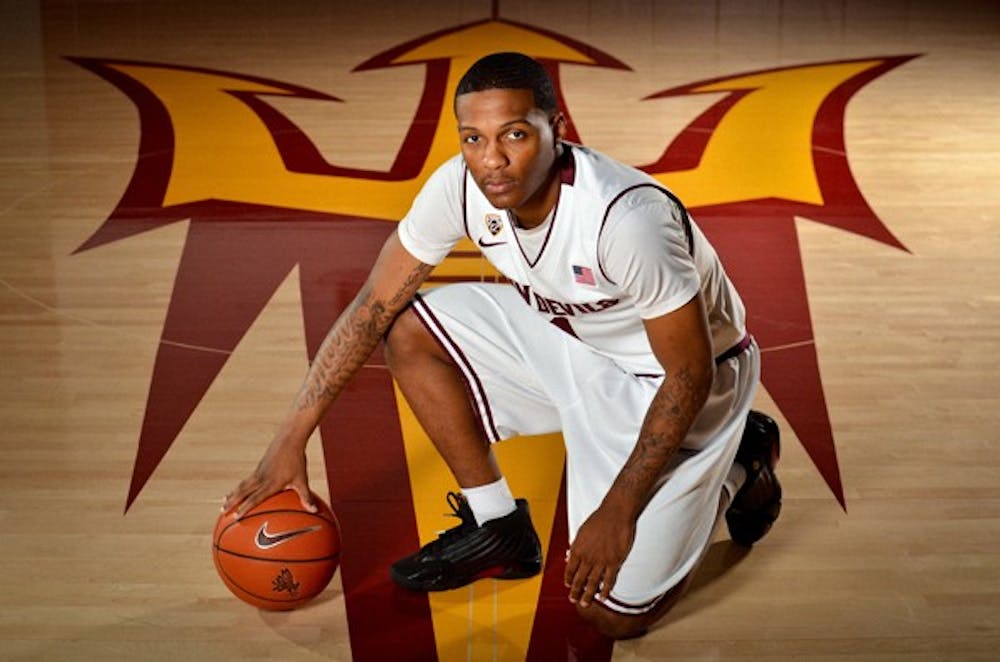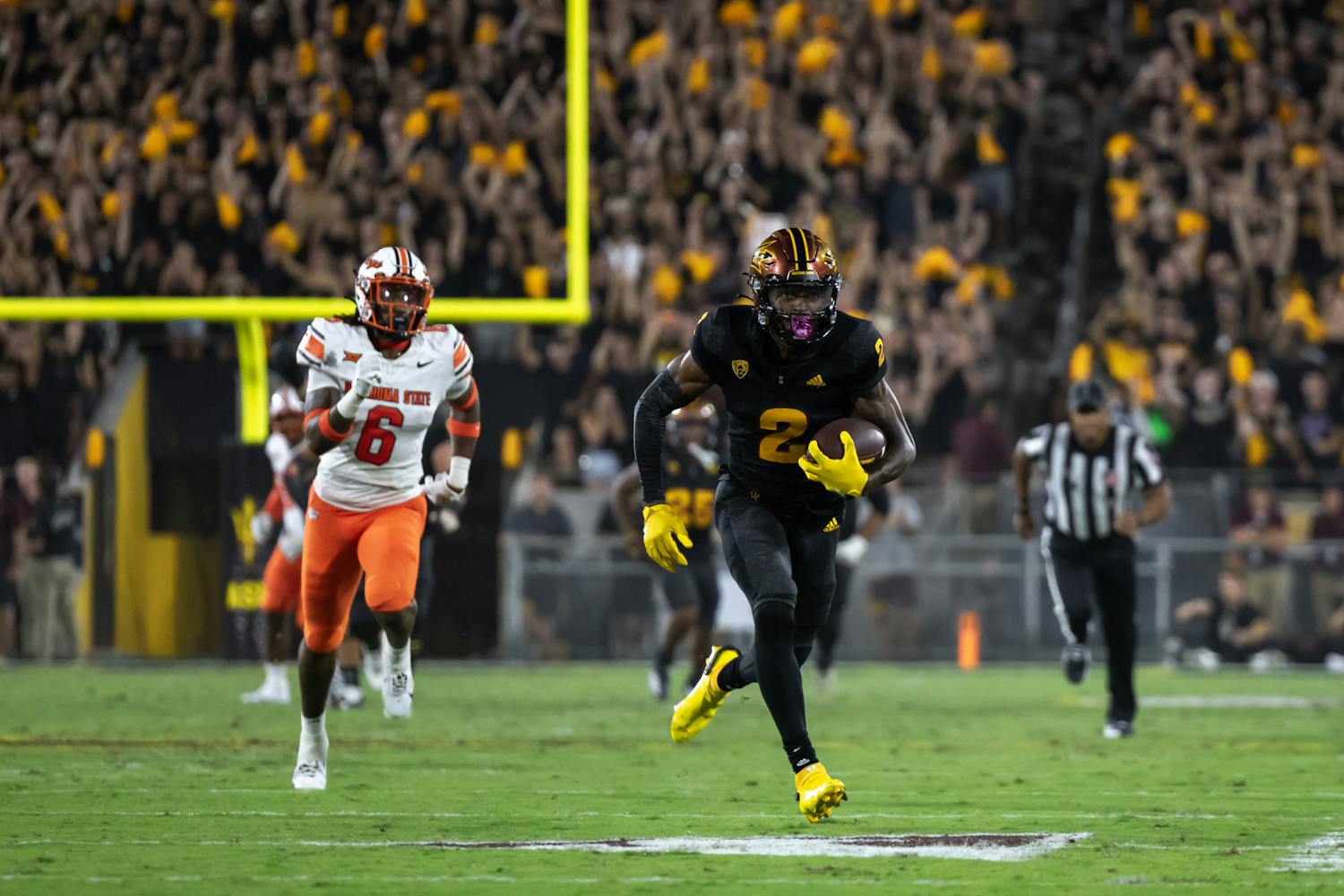Redshirt freshman guard Jahii Carson was the No. 33 best player in the country according to Rivals.com last year, but he won’t get a chance to show it anytime soon.
The Mesa native was expected to make an immediate impact at ASU, but those plans came to a screeching halt when the NCAA ruled him academically ineligible.
Although he’s able to practice with the team, Carson won’t get a chance to play until next season if he’s on track to graduate.
Carson spent time with The State Press discussing his academic ineligibility, Keala King and everything in between.
The State Press: Are you on track to play next year academically?
Jahii Carson: Definitely. In college, there’s just a lot more help for you academically with academic advisers. You have the ability to go get help from your professors.
In high school, it’s a little bit more of an independent thing. I’m on pace with 14 credit hours and I’m on pace to graduate right now.
SP: How frustrating has it been to sit out this season?
JC: It’s definitely been frustrating for me, but I just look at everything as a positive lesson for me. God puts me in situations to help me in the future, and I just think this is one of the obstacles He’s making me overcome.
SP: What element of your game have you been working on the most?
JC: I’m trying to work on a long-range jump shot. My jump shot right now, people have heard me say it’s inconsistent. I’ve been more of a scorer, so when scorers get hot, they can make jump shots.
I’ve been criticized as not being a consistent jump shooter. I’m working on a jump shot and I’m working on a long-range three ball to stretch the defense out. I think that would help a little bit.
SP: You’re watching film of current NBA point guards with coach Herb Sendek. What are you learning from these sessions?
JC: I have a tendency to have a little bit of a flash. That’s one of the things that I have to find the right time and the right moment for those flashes. Making the simple play is the best thing that I need to start working on. There are a lot of times I make the right play, but there are a lot of times where I try to get fancy with the pass. It gets there, but my ball is being touched. Point guards shouldn’t have too many players deflecting his ball.
I look at Chris Paul, Steve Nash and Tony Parker. I see how simple they make the game for their teammates. That’s one of the things I want to do with my teammates. If they’re open, I don’t want the pass to be over their heads or at their knees. I want it to be at their shooting pocket and get the shot off nice and crisp.
I want to be an overall player — defensive player, offensive player, team leader. That’s one of the things a point guard needs to be, like a quarterback on the field. Everything rides on him. If the team loses, blame it on the quarterback. If the team loses, blame the point guard.
SP: How have these sessions helped your relationship with Sendek?
JC: He sees stuff in me that I don’t even see in myself, and that makes me that much better of a player because I only want to make him proud. He says I have a gift that not a lot of people have and wants to help me get that much better. He helps me out a lot, especially at the point guard position.
He knows the game well. He’s one of the smartest coaches I’ve been around and he just knows the game. He knows he can help me, and I’m basically like a sponge. I just try to soak in all the information I can from him. That helps our relationship on the court because I know what he expects.
SP: Looking at next season, many feel the weight of the program is on your shoulders. How have you responded to that?
JC: I respond by working hard in the gym. The best way to come out and prove people wrong or right is to be prepared. If you’re not prepared, you can’t play to the best of your abilities. The best thing I try to do is be prepared. I have a lot of pressure on me and if I’m prepared, there’s no way I can fail. I just try to come out and work as hard as I can every day. God is going to help me. He’s not going to put me in a position I can’t handle. If there’s pressure there, it’s for a reason.
SP: Where are next year’s expectations, given the program’s struggles?
JC: The bar is going to be set high. Trent Lockett is a great player. He shows great leadership on and off the court academically and athletically. Carrick Felix is the same thing. They’re juniors right now. I’m coming in with high confidence and high expectations about myself, so I set the bar high for the team also. Coach Sendek also does. The freshmen coming in, they know that we’ve been struggling lately. In order to come in and play immediately, they’re going to have to step their game up tremendously. Kyle Cain is a sophomore and wants to make an impact. He wants to be looked at as one of the best big men in the Pac-12. Everybody’s expectations are going to be set that much higher.
A lot of guys feel like they’re safe. There are not a lot of bodies there (right now). They feel like, ‘Oh, nobody can take my position because I’m the only one here.’ A lot of guys coming in are combo guards, so they’re going to be pushing each other everyday to make us that much better as a team.
SP: How did the team respond to sophomore guard Keala King’s dismissal?
JC: A lot of players were connected to Keala because he’s a charismatic guy. He’s just a funny guy to be around. But a lot of times, he was just disruptive during practices, which made some guys resent him in such ways. But he’d also play good in the games, which was an even keel. You really can’t be mad at the guy because he plays well in games, but he’s also kind of a headache in practice.
When he was dismissed from the team, it was tough on me because he’s one of the reasons I came to Arizona State. I had a bond with him on the AAU circuit. He and Kyle Cain were really close so it took a little toll on Cain, but I think it was for the best. The team has responded well to it. We haven’t had any letups in practice. We still have the same amount of energy. We just have been trying to work that much harder because he was a valuable piece that we miss.
SP: Did the players see it as a wake-up call?
JC: A lot of people, when you’re coming out of high school, the AAU circuit makes it feel like they have a sense of entitlement. Being ranked top 50, top 25, five-star recruit, tons of offers, a lot of kids when they get to the University feel that they have a sense of entitlement. I think that’s one of the things that’s something that they have to get rid of if they want to be successful at a basketball program and play to the best of their abilities. That’s one of the things that I think a lot of kids have problems with, is making that transition from high school to college.
SP: How have you dealt with that challenge given your high school achievements?
JC: I was definitely one of the kids that had a sense of entitlement. That’s one of the reasons why I had academic issues coming out of high school. I was in the top 30 or top 35, but I felt like I had a sense of entitlement. One of the things I didn’t focus on was academics. The bordering scale of me qualifying was by 0.1, so if I would’ve focused that much more and didn’t have that sense of entitlement, I think I’d be playing this season.
Off that, I just have matured. Playing for my team and playing for myself is what keeps me humble. Playing for someone else who plays just as hard as you every day makes me that much more humble. I see there are guys out there who don’t have Division I scholarships who love basketball just as much as me, so I have to be grateful for the game.
SP: Did you feel the NCAA ruling was a turning point in this mentality?
JC: Instantly it was. When they told me that the NCAA ruled me ineligible to play this season and the amount that I missed it by, it was definitely a wake-up call. It’s just made me that much more mature and I take nothing for granted. I don’t want to take anything for granted. I just want to see it as you’ve got to take everything seriously. You never know what could be taken away from you at any point in time.
When I was in high school, I’ve always had Division I looks. I’ve always wanted to go to Division I and I always knew I would go Division I. I always knew academically, I had to be able to qualify, and that’s one of the things that handicapped me. Now, I don’t want anything to handicap me from playing the game I love again.
Reach the reporter at mtesfats@asu.edu
Click here to subscribe to the daily State Press newsletter.







